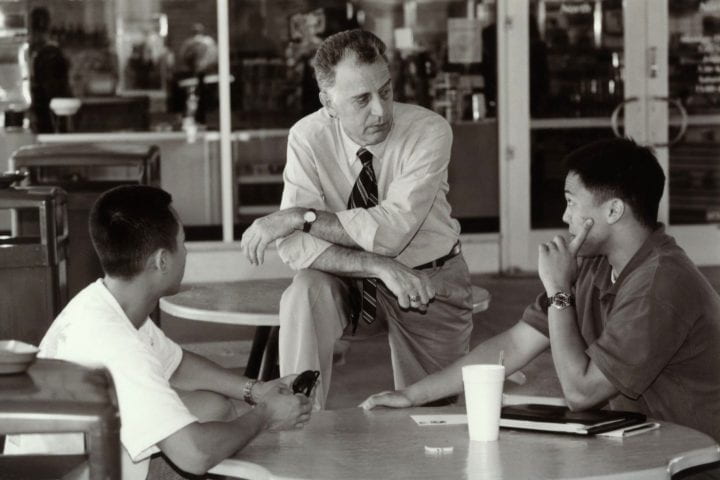They had the whole world in their hands
On the occasion of the Earth system science department’s 20th anniversary, Chancellor Emeritus Ralph Cicerone says UCI was the first to study human impact on the environment in an interdisciplinary way.

UC Irvine’s top-ranked Earth system science department celebrates its 20th anniversary this week. Founding chair Ralph Cicerone, who now heads the National Academy of Sciences and the National Research Council, recounted in a recent interview how the first academic unit anywhere devoted to studying the entire planet came to be.
The idea originated in a late-1980s UCI faculty report that concluded Earth science should be researched and taught at the fast-growing campus. The California Institute of Technology, UCLA and others had programs on earthquakes, oceanography and other topics of interest in Southern California – but nothing comprehensive.
“Irvine was becoming a very good university, and yet you could graduate without the opportunity to major or take an elective in geology or Earth science,” Cicerone recalled. “Human-caused perturbations of the entire Earth were beginning to emerge: acid rain, stratospheric ozone depletion, climate change, and possible nuclear winter brought on by the explosion of nuclear weapons. Irvine decided that as the campus grew, they had to add this kind of program that would scientifically look at all those things.”
A midcareer scientist known for his atmospheric research, Cicerone was drafted from Boulder, Colo., to take the helm. “I had no intention of accepting the job, but when I visited, what I saw was a tremendous kind of can-do attitude, of ‘let’s make something happen,’” he said. “At the same time, my wife got an offer to be a professor in the cognitive sciences department, and she was really interested.”
Cicerone thought studying the Earth’s continents, oceans and atmosphere together was critical. “I think a lot of people weren’t convinced there would be many more human-caused global scale problems. I was convinced this was just the beginning,” he related. “If you looked at human population growth and economic development, you could see that a lot of additional resource and pollution issues were going to emerge. We needed a good scientific basis for society to handle those current and future problems.”
He crafted a mission statement for the department that read: “To detect changes in the Earth system (air, waters and land), to quantify those changes, to understand their causes and to predict future changes on human time scales.”
Despite budget woes, Cicerone said, UCI officials were “very bold. They authorized faculty positions and let us recruit them even when UC was cutting back.”
A crucial supporter was William Lillyman, then UCI’s executive vice chancellor: “In 1988, he gave the OK to hire six full faculty members. He had enough faith in (then physical sciences) dean Hal Moore to say, ‘Go ahead – take the chance,’ and put his commitment in writing. And he was a professor of German literature!”
In preparation for a campus visit Thursday, Sept. 15, to celebrate the department’s beginnings, Cicerone located old scientific journal ads for the initial positions. He recalled that he also “wrote personal letters to a couple hundred scientists around the world. I said, ‘Keep your eyes open for the kind of people we want.’ We were going to do different things, and we were going to be the best.”
“We wound up with a fantastic group,” he continued, “including Susan Trumbore, Michael Prather, Ellen Druffel, William Reeburgh and Gudrun Magnusdottir. None of us had our Ph.D.s in the same field. We had expertise in chemistry, electrical engineering, astronomy, geology, meteorology, physics and oceanography. It was hugely important, because we came in with different perspectives but all subscribed to the same mission.”
The fledgling unit and its energetic chair moved half a dozen times before paint executive John Croul helped fund the state of-the-art, 68,000-square-foot facility that bears his name and houses ESS.
The department was originally dubbed “geoscience,” but that traditionally meant oil exploration, earthquakes and the geochemistry of minerals. Like new parents, faculty batted around possibilities and eventually selected “Earth system science.” The unit was so successful that after a few years, the University of Chicago, UC Berkeley and others tried in vain to relocate the entire department to their campuses.
Cicerone, who went on to become UCI’s chancellor from 1998 to 2005, said that ESS has consistently fulfilled its mission, “establishing a very good scientific basis for policymaking” on greenhouse gases, air pollutants, and ocean and forest change. Faculty members have contributed to reports by the Intergovernmental Panel on Climate Change, the NRC and other federal science advisory groups.
“There’s never enough information, but compared to where we were 15 years ago, it’s terrific,” he said. “Now if a problem or question arises related to these areas, you can call someone at UCI to talk about it – and if they don’t know, they can tell you who to talk to in Massachusetts or France. They know everybody, and everybody knows them.”
Scores of universities now have similar programs, and UCI’s ESS department placed second and sixth in national rankings last year. “When you measure the impact of papers cited as important research contributions, Irvine is consistently first or second,” Cicerone said. “It’s always the same top five: Harvard, Caltech, MIT, Irvine and a couple of others. And Irvine has only been granting Ph.D.s for 14 years. It just started a bachelor’s program two years ago.”
He praised the department’s strong work on glaciers. Indeed, everyone from former Vice President Al Gore to the BBC has expressed interest in a new map of Antarctic glacial movement – published Sept. 9 in Science – produced by Professor Eric Rignot and his graduate researchers.
“Are the glaciers changing or not? As recently as 2006, people were not agreeing, but faculty here at Irvine and others around the world are making such good measurements in Greenland and Antarctica that scientific opinion is coalescing,” Cicerone said. “This is very important for understanding sea-level rise and climate change.”
He steered clear of the politics surrounding proposed regulations, saying only that “to deny scientific facts is a pretty dangerous undertaking.”
“We’ll never have 100 percent of all the information you need to please everybody, but in terms of a knowledge base and understanding for people to begin to talk sensibly about solutions, yes, we do,” he said. “It’s hard to make public policy – be it national rules or international treaties – and you don’t always get the results you should, but without the science, you’re dead.”
Asked for an enduring memory of the ESS department’s beginning, Cicerone didn’t hesitate:
“Late at night or early in the morning, I would get the same two thoughts every day. One was, ‘Wow, what a fantastic opportunity! This campus is making a commitment to do this right.’ And then the second thought would be, ‘But nothing’s here!’
“Faculty, students, laboratories, courses, classrooms – none of it existed. We had complete freedom but nothing established. We had to figure all of that out. My friends around the country had no idea why I was doing this, but it was wonderful, just wonderful to be able to do it.”


